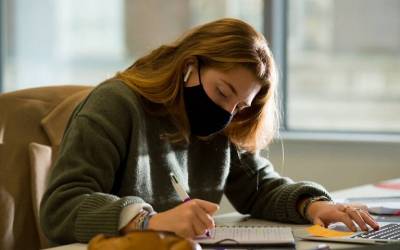UCL's response to the pandemic
UCL Medical Students support NHS frontline during the COVID-19 pandemic
Since the beginning of the pandemic, our medical students have made a profound contribution to the NHS, clocking up thousands of hours of healthcare support work and adding vital extra capacity to frontline staff. They have volunteered across all seven UCL Medical School partner hospitals; University College London Hospital; the Royal Free London, the Whittington Hospital; North Middlesex University Hospital; and Luton, Dunstable and Lister hospitals (part of East and North Hertfordshire NHS Trust).
Their experiences would test the most resilient of us. Many have spoken of the humbling nature of what they have seen and dealt with on ICU wards, and how these experiences will shape them as doctors, making them more determined, better prepared.
In addition to urgent medical care, students have been a lifeline to those in need. For some this has been handling calls to NHS 111, or GP out of hours services, others have facilitated video calls between patients and their families or simply made time to sit and talk to patients who would otherwise be alone.
““Without question, over the past 12 months UCL’s medical students have become an essential and integral part of UCLH; their medical training has ensured we have had enough support to care for our patients during the toughest times.
“No matter what we’ve asked them to do – working in intensive care, acting as family liaison, or helping out on the daily ward rounds – each student has proved reliable, professional and resilient. We simply could not have managed without their support and we thank them all.”
Professor Marcel Levi, Chief Executive at University College London Hospitals NHS Foundation Trust
We could not be prouder of how our students have conducted themselves in these extraordinary times.
Read what they had to say of their experiences here.
Tracking the effect of the pandemic on year 11 students’ prospects

Recruiting a representative group of 12,000 year 11 students the COVID Social Mobility and Opportunities (COSMO) Study will seek to understand their experiences of home-schooling and cancelled exams, attitudes to the pandemic, health and wellbeing, and future educational and career hopes.
We know already that the effects of pandemic have been felt unevenly, particularly by those from disadvantaged backgrounds. COSMO’s high quality data will provide vital new evidence on these unfair consequences, allowing education policymakers and practitioners to plan how best to respond.
The study will receive £4.6 million from the UK Research and Innovation (UKRI) and will follow the young people over at least two years, with aims to continue collecting data into their adult lives.
Identification of over 200 long Covid symptoms prompts call for UK screening programme
Studies have estimated that one in seven people may experience long COVID. With symptoms ranging from ‘brain fog’ to tinnitus, itchy skin and tremors it is suspected there may be tens of thousands of people suffering from the condition in silence, severely impacted in their daily lives and return to work.
By reaching out across an online support group, an international team of researchers led by Dr Athena Akrami (neuroscientist at the Sainsbury Wellcome Centre at UCL) last year compiled the most comprehensive study of the condition to date, to establish a foundation for further medical investigation.
Armed with responses from 3,762 eligible participants from 56 countries, they identified a total of 203 symptoms and tracked 66 of them over seven months, building and analysing quantitative data that has now been published by The Lancet and shared with the World Health Organisation (WHO).
The team who have all either had or continue to have long COVID, are now calling for clinical guidelines on assessing the condition to be significantly widened to include cognitive and neurological symptoms. Their work highlights the importance of patient-led research as we seek a deeper understanding of COVID-19 and how to best support recovery.
Images
- Landing page thumbnail: Dr Athena Akrami on Youtube
- Student wearing mask, credit Kirsten Holst for UCL
 Close
Close

